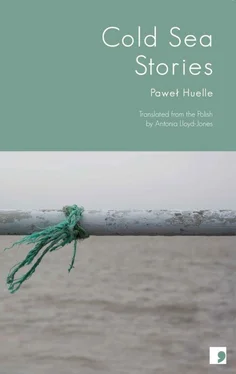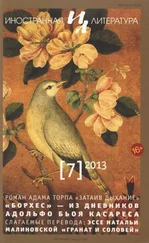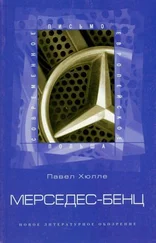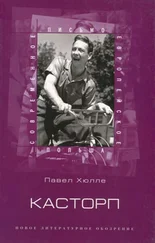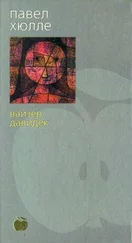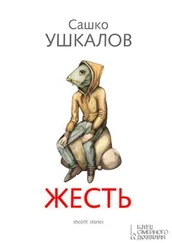‘I meant crossing the border, an invasion, you know, all our brothers in the Warsaw Pact.’ He changed gear and rode even faster. ‘Like we invaded the Czechs with them in 1968.’
I had no time to answer, because Fredek was already braking outside the shipyard gates, where in the falling twilight the last of the gapers and passers-by were hovering; shortly after, we had collected some bundles of bulletins from Mikołaj at the pass desk, wrapped in the Voice of the Coast and tied with ordinary string. Then we slowly rode abreast, through the park along Victory Avenue, continuing our conversation about the possible, or impossible invasion, especially with the East German People’s Army participating, which here, in Gdansk, was sure to be given an enthusiastic reception, considering the traditional Polish-German friendship; Romania would definitely not take part, but Czechoslovakia was sure to be forced into it, whereas Hungary’s involvement – as we both agreed – was not a foregone conclusion, because as the Russian generals knew from previous experience, the Hungarians always sided with the Poles, just as we had fought in the Hungarian uprisings, so to sum up – we were just passing the Opera house – their leader János Kádár could sleep in peace, though we couldn’t say the same for the East German Erich Honecker, the Czechoslovak Gustáv Husák and Leonid Brezhnev, that exotic trio, who might be joined by the Bulgarians, as the world’s greatest Russophiles, if you don't count the French, of course. The tram depot, the construction firm base, the ball-bearing factory, then the paint and lacquer plant in Oliwa – that was our first route. It all went smoothly and very quietly: at each gate someone wearing an armband collected a wad of bulletins from us, and sometimes we shared a cigarette, chatting about the same thing all the time – whether they would finally send an authorised delegation from Warsaw to start talks, not about a pay rise, but about free trade unions, which no one had, from the Elbe to Vladivostok.
Our night rides had no hint of conspiracy or special mission about them: the workforce in each place received bulletins from the shipyard via their own delegates and couriers during the day, and we only delivered whatever was issued in the afternoon or evening, so next day at dawn everyone had the latest information – the late edition, said Fredek, handing a bundle of news sheets in at the gate, the evening bicycle express!
Sometimes, when we didn’t feel like chatting and we rode a long stretch in silence, I thought about Lucjan. He had just about witnessed my birth: in 1957, when my father brought me and my mother home from the hospital to Chrzanowski Street in the Opel he borrowed for the occasion from Mr Hoffmayer, Lucjan was waiting outside our door. Thin and haggard, in an old raincoat and a railwayman’s cap, he looked like an arrival from the spirit world. His name had always been remembered on All Soul’s Day, but no one believed he was still alive anymore. In September 1939, when the Soviets occupied Lwów, he had been arrested and deported to an unknown place. He had not turned up in any of the Polish armies later on, not Anders’, nor Berling’s, nor in post-war London, nor on any Red Cross list. ‘He was killed at Katyń,’ my father thought, ‘or in one of the Gulags, like millions of anonymous people.’ Meanwhile, here was Lucjan standing in the stairwell; seeing my mother’s surprise, he took from her the quilt I was wrapped in and asked, ‘A son or a daughter?’ Afterwards, when he and my father were sitting in the kitchen, and my mother was washing me in a baby bath before the burning stove, Lucjan took a good look at me and said: ‘Well I never, what a wee scrap of a fellow – where I’ve come from he wouldn’t last as long as five hours.’ I was to hear this remark from my parents many times, and forever after in my mind his figure was shrouded in a gloomy aura that never lifted as the years went by. It wasn’t to do with the facts themselves, which he did relate, though rather reluctantly. That one remark of his contained a grim reminder, like a dull thud from an abyss that emanated total and utter emptiness. Even in later years, when he was living in Warsaw and used to visit us every summer by the sea, as I became more and more aware of his amazing linguistic genius, I still kept running into that indelible mark in his personality. Perhaps that was why he rejected the permanent job offers that came with time. In Warsaw he was the bookkeeper at a coal yard. In Gdansk, where a few years before retiring he eventually moved to our neighbourhood, into a small attic room with a kitchen, he settled for a job as a night watchman. In this final period he gave up the radio, didn’t read any newspapers and even stopped going to church; he only came to our flat for Sunday dinner once a month. Once blindness, and soon afterwards a progressive illness, had chained him to his bed and an armchair, he refused to move in with us, and gave any help a cool reception. Nevertheless I could tell he enjoyed my visits, perhaps for the exact reason that - after coming back from hell - he had seen me on the very threshold of life. Now I was seeing him on its other threshold, the final one, and it felt as if we had both ended up in the same circle, but at different points along it.
A few bicycling nights later I visited him again. He asked me to tell him our exact routes. Rather than details of the strike, he was more interested in the look of the port from Siennicki Bridge where my chain came off; the driver of a police radio car who went past us had slowed down noticeably at the sight of two young men fixing a bike halfway across the bridge in the middle of the night. Were the tugboats at anchor illuminated? What about the wharves? Can you see the rust on the tramlines at night, or only in daylight? Those were Lucjan’s questions, but when I read to him, one after another, the strike committee’s resolutions, and then selected information from the bulletins saying that the whole country was on strike, or ready and waiting, that human solidarity had never been so genuine or so profound in our country, and that we would win, because after all one day we had to win, since we had always kept losing, at least for the last two hundred years, he just nodded politely and said: ‘All right, that’s all politics. But what are you going to do afterwards?’
‘But you know that,’ I said, a little irritated, ‘I’m going to write my dissertation on Iwaszkiewicz and how his Ukrainian stories echoed Romanticism.’
‘And then what?’
I didn’t really know what he meant. What could happen then, except life? Marriage? Work? Travel? I had never lived in terms of the future, I didn’t like projects, plans or specific ventures, because anyway, as Lucjan knew perfectly well, in our everyday reality nothing ever came entirely true, and at the drop of a hat it could all change, suddenly collapse, be destroyed, wiped out or smashed to bits. So how could he ask questions like ‘then what’? If Lucjan weren’t blind I’d have answered by asking: ‘Do you think I’m clairvoyant?’ But it wasn’t appropriate for me to say that, so after a short silence I simply replied: ‘I don’t know.’
He looked worried by my answer. For a moment his furrowed face wrinkled into a mask of concern.
‘I mean your dreams. Oculos habent et non videbunt , you understand? “Eyes have they, but they see not.” Psalm 115. Towards the end it clearly says: “ The dead praise not the Lord, neither any that go down into silence. ”’
I shrugged my shoulders. Did he mean my religious beliefs? We had never touched on that sort of topic, not even when he had occasionally explained an extract from the Bible to me because I needed it for an Old Polish literature class. In any case, I was already late. At the shipyard conference hall the talks with the government delegation were just starting, and I wanted to be there on the spot and not miss anything; the negotiations broadcast by cable radio could only be heard at the shipyard gates. As usual I left him the cake my mother had baked, and we said goodbye until next week.
Читать дальше
